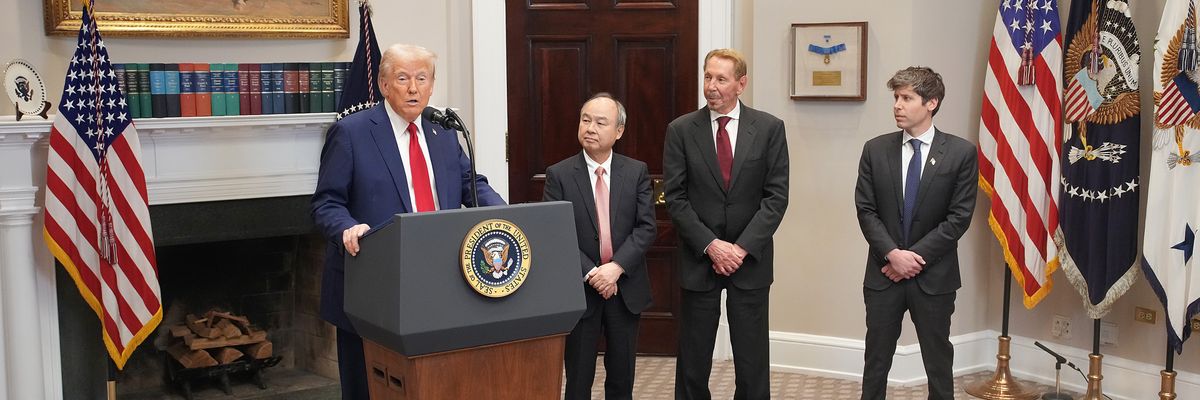Watchdog Says Trump-Backed AI Data Center Push 'Raises Massive Antitrust Concerns'
"Even if it turns out to be structured to avoid antitrust law enforcement, it plainly will concentrate power in a small number of corporate hands," said Public Citizen co-president Robert Weissman.
Eloise Goldsmith
Jan 22, 2025
COMMON DREAMS
U.S. President Donald Trump on Tuesday highlighted a new private-sector initiative to invest as much as $500 billion over four years into developing infrastructure to support artificial intelligence, starting with a raft of power-intensive data centers in Texas. The move drew swift criticism from one watchdog group on antitrust and environmental grounds.
The initiative, Stargate, is a joint venture of the tech firms OpenAI, Oracle, and SoftBank. Trump hosted the leaders of those companies—OpenAI CEO Sam Altman, Oracle Chairman Larry Ellison, and SoftBank CEO Masayoshi Son—at the White House to announce the initiative just one day after he signed an executive order rolling back a Biden-era executive order implemented in 2023 that sought to put safeguards on AI.
"I think this will be the most important project of this era," said Altman, according to the Washington Post. "We wouldn't be able to do this without you, Mr. President," he added, though both the Post and and the Associated Press noted that the creation of the partnership predated Trump's return to the White House.

U.S. President Donald Trump speaks in the Roosevelt Room of the White House while SoftBank CEO Masayoshi Son, Oracle CTO Larry Ellison, and OpenAI CEO Sam Altman look on on January 21, 2025 in Washington, DC.
(Photo by Andrew Harnik/Getty Images)
Biden's 2023 executive order on AI placed safety obligations on AI developers and called on federal agencies to examine the technology's risks. But Biden, too, was interested in boosting AI infrastructure development. Right before he departed, in early mid-January, Biden signed an executive order directing federal agencies to identify government sites that could be leased to private companies for the construction of AI data centers.
Environmental groups and tech advocacy groups have long advocated for greater safeguards on AI, pointing to the technology's potential impact on the climate emergency.
The average query in the AI-powered chatbot ChatGPT requires 10 times the amount of energy a Google search needs, and "in that difference lies a coming sea change in how the U.S., Europe, and the world at large will consume power—and how much that will cost," according to a 2024 analysis published by the investment firm Goldman Sachs. Goldman Sachs analysts believe that AI will represent about 19% of data center power demand by 2028.
AI infrastructure is also water intensive. Global AI demand is projected to require more water extraction in a year than the country of Denmark by 2027, according to one study.
"The alarming surge in these centers' energy demand is on track to extend the fossil fuel era... [and] it is already increasing costs for some consumers and threatens to bring about a larger affordability crisis, while lining the pockets of Big Tech billionaires," said Karen Orenstein, a director at the environmental group Friends of the Earth, following Biden's January executive order. "For the sake of our planet and its people, we need to rein in Big Tech and regulate AI," she said.
Meanwhile, the joint venture to build out AI infrastructure has also drawn scrutiny from one watchdog group over concerns of corporate concentration.
Public Citizen co-president Robert Weissman said Wednesday that "the new Stargate plan—at minimum—raises massive antitrust concerns. Even if it turns out to be structured to avoid antitrust law enforcement, it plainly will concentrate power in a small number of corporate hands."
"Absent a commitment to bring on new, renewable energy to power an even greater spike in AI power demand, the Stargate build out threatens to worsen the rush to climate catastrophe and to drive up consumer electric bills," he added.
Another observer, Jeffrey Westling of the American Action Forum, remarked on the timing of the announcement.
"Interesting to wait to announce this until the Trump Admin. Assuming its all private investment, maybe they were worried about FTC/DOJ antitrust scrutiny?" he wrote on X Tuesday.
Trump Reportedly Picks Medicare Advantage Lobbyist for Top Health Budget Role
Don Dempsey would join Centers for Medicare and Medicaid Services nominee Mehmet Oz and other supporters of privatized Medicare Advantage plans in the new administration.

'This Should Be a National Scandal': For-Profit Medicare Advantage Plans Using AI for Denials
(Photo: Alex Wong/Getty Images)
Jake Johnson
Jan 23, 2025
COMMON DREAMS
U.S. President Donald Trump is reportedly set to appoint a lobbyist for the for-profit health insurance industry for a top White House budget job, a move likely to heighten concerns about the new administration's expected push to bolster Medicare Advantage plans that deny necessary care and dramatically overbill the federal government.
The Financial Timesreported Wednesday that Trump is "poised to appoint" Don Dempsey as associate director of the Office of Management and Budget's health programs. The appointment would give Dempsey "sweeping power over the $1.8 trillion U.S. healthcare budget and responsibilities of the 13 divisions and agencies," the newspaper noted.
Dempsey is currently the vice president of policy and research at the Better Medicare Alliance, a lobbying organization that describes itself as "the nation's leading research and advocacy organization supporting Medicare Advantage." FT observed that the group is "funded by insurance companies including UnitedHealth Group and Humana"—the two largest Medicare Advantage insurers in the United States.
Trump's reported choice represents another potential boon for Medicare Advantage, a program run by private insurers and funded by the federal government. As STATreported last month, "Medicare Advantage insurers thrived under the first Trump administration, and it's expected to happen again now that Trump is returning to the White House and Republicans are taking control of Congress."
The president has nominated Mehmet Oz, who has previously expressed support for a plan dubbed "Medicare Advantage for All," to lead the Centers for Medicare and Medicaid Services (CMS), a move that one watchdog warned would kick Medicare privatization efforts "into overdrive."
Since his inauguration earlier this week, Trump has taken a number of steps that have alarmed healthcare advocates, including rescinding Biden-era executive orders aimed at lowering prescription drug prices and strengthening Medicaid and the Affordable Care Act.
"On one hand, what we see coming from the executive orders by Trump is important because it shows us the direction they are going with policy changes," Sarah Lueck, vice president for health policy at the Center on Budget and Policy Priorities, toldKFF Health News. "But the other track is that on the Hill, there are active conversations about what goes into budget legislation. They are considering some pretty huge cuts to Medicaid."
Don Dempsey would join Centers for Medicare and Medicaid Services nominee Mehmet Oz and other supporters of privatized Medicare Advantage plans in the new administration.

'This Should Be a National Scandal': For-Profit Medicare Advantage Plans Using AI for Denials
(Photo: Alex Wong/Getty Images)
Jake Johnson
Jan 23, 2025
COMMON DREAMS
U.S. President Donald Trump is reportedly set to appoint a lobbyist for the for-profit health insurance industry for a top White House budget job, a move likely to heighten concerns about the new administration's expected push to bolster Medicare Advantage plans that deny necessary care and dramatically overbill the federal government.
The Financial Timesreported Wednesday that Trump is "poised to appoint" Don Dempsey as associate director of the Office of Management and Budget's health programs. The appointment would give Dempsey "sweeping power over the $1.8 trillion U.S. healthcare budget and responsibilities of the 13 divisions and agencies," the newspaper noted.
Dempsey is currently the vice president of policy and research at the Better Medicare Alliance, a lobbying organization that describes itself as "the nation's leading research and advocacy organization supporting Medicare Advantage." FT observed that the group is "funded by insurance companies including UnitedHealth Group and Humana"—the two largest Medicare Advantage insurers in the United States.
Trump's reported choice represents another potential boon for Medicare Advantage, a program run by private insurers and funded by the federal government. As STATreported last month, "Medicare Advantage insurers thrived under the first Trump administration, and it's expected to happen again now that Trump is returning to the White House and Republicans are taking control of Congress."
The president has nominated Mehmet Oz, who has previously expressed support for a plan dubbed "Medicare Advantage for All," to lead the Centers for Medicare and Medicaid Services (CMS), a move that one watchdog warned would kick Medicare privatization efforts "into overdrive."
Since his inauguration earlier this week, Trump has taken a number of steps that have alarmed healthcare advocates, including rescinding Biden-era executive orders aimed at lowering prescription drug prices and strengthening Medicaid and the Affordable Care Act.
"On one hand, what we see coming from the executive orders by Trump is important because it shows us the direction they are going with policy changes," Sarah Lueck, vice president for health policy at the Center on Budget and Policy Priorities, toldKFF Health News. "But the other track is that on the Hill, there are active conversations about what goes into budget legislation. They are considering some pretty huge cuts to Medicaid."
.jpg)
No comments:
Post a Comment